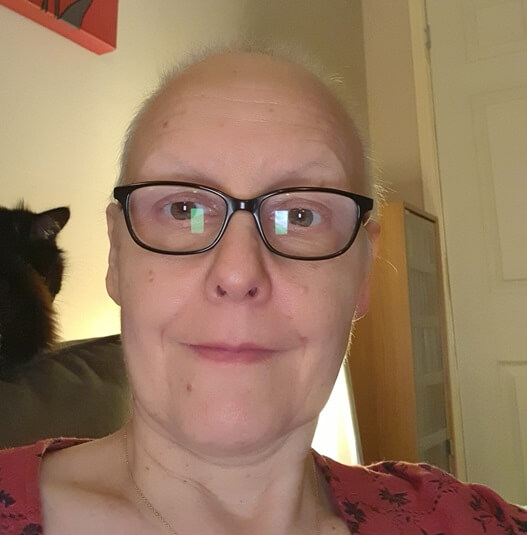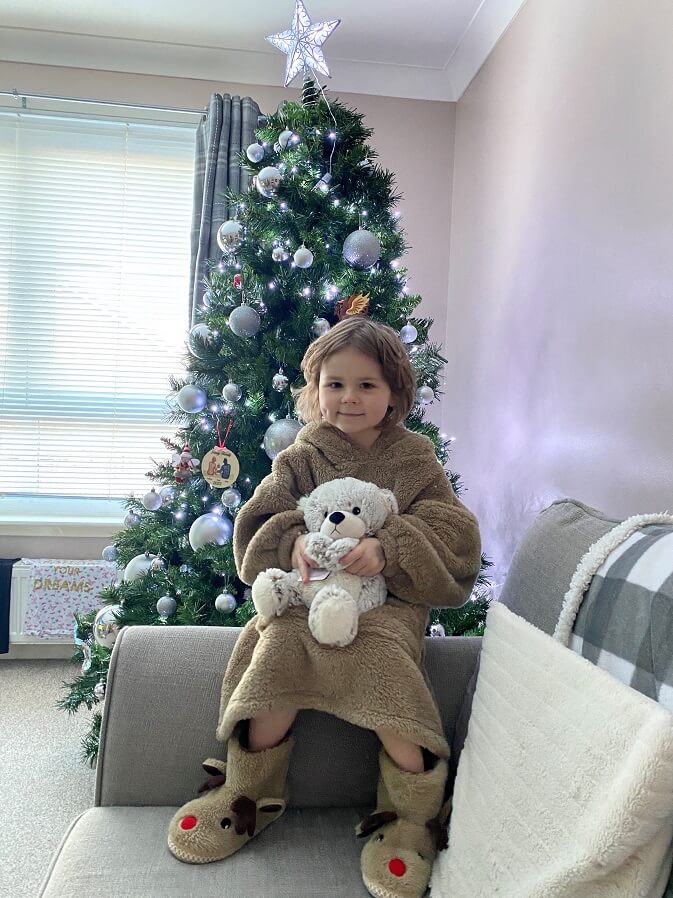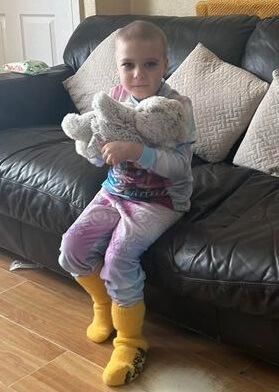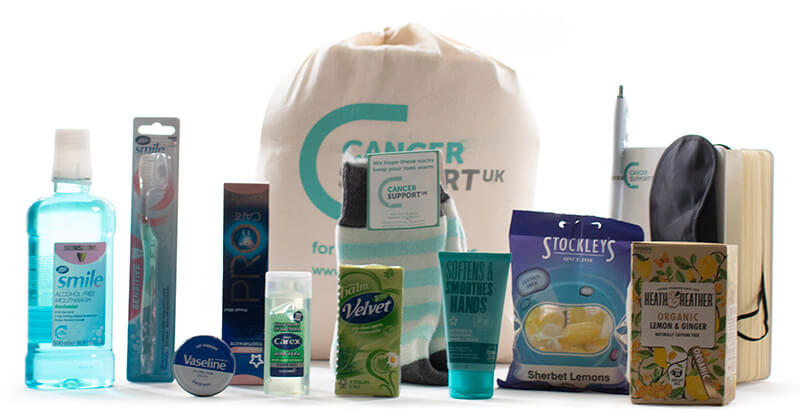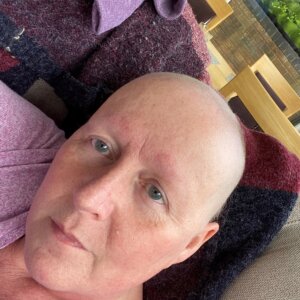
“It’s taken me a long time to emotionally deal with being told I have cancer.”
Julia’s cancer journey began in May 2021, when she was recalled two weeks after her first routine mammogram. After multiple biopsies, Julia heard the words no-one wants to be told: “You have breast cancer, you need a mastectomy.” This was just the start of her cancer rollercoaster.
“During the mastectomy, an expander was placed inside my chest to make way for an implant in the future. This became infected and I felt so ill I thought I would die.
“I was on multiple antibiotics and had to have the site washed out every other day. They eventually had to remove the expander, but by this time I was told the cancer had spread to my lymph nodes and I needed an axillary clearance, which they wouldn’t do until the infection had completely cleared.
“I had five months of chemotherapy and three weeks of radiotherapy, following which I had an unexpected vaginal bleed. Two attempts to take biopsies failed, so a total hysterectomy was performed in September 2022. So it’s been a rough old journey and that’s only the physical attack.
“Emotionally, I felt so battered and my inner spirit was a quivering wreck. Every cancer advert on the TV was like a knife in my gut.
“Some friends and family stayed away from me (that was a big surprise). Some told me that they knew someone who had cancer in the past, but now they are fine. Although I was glad that person had come through it and was living their best life, I didn’t find these comments useful at all.
“What was funnier, were those who told me about the people they had known who hadn’t survived. They would then remember who they were talking to and say: ‘but that won’t happen to you.’
“Most people said I was brave. Well, that was even funnier. ‘Brave’ was like I had a choice in all this, but I didn’t. This was a ride I couldn’t get off.
“At every appointment leaflets were thrust at me, telling me what a mastectomy was, what an axillary clearance was etc. But it turns out there were lots of things they didn’t tell me.
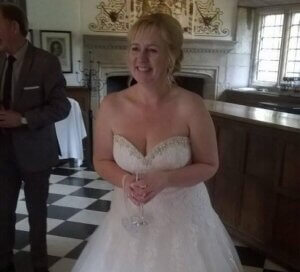
Julia before her cancer surgery and treatment
“I wish they had told me that before my first surgery I would look at the affected breast and hate it. That after the surgery it would take over a year for me to be able to look at the scars in the mirror without pulling a disgusted face. No one told me this.
“No one told me that it would break my heart and spirit to lose not just the hair on my head, but also every hair on my body, making me feel neither feminine nor human. That losing the hairs from my nose would cause nosebleeds and that the combination of hair loss from my face and head would have me looking like Uncle Fester.
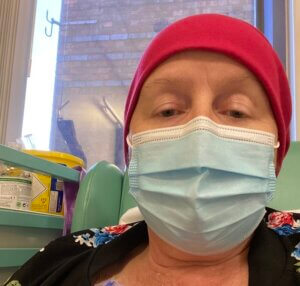
Julia during her cancer treatment
“No one told me that it could take such a long time to bounce back, that every day could be a huge effort just to exist. That some days the thought of cancer returning could take over and no one, apart from those who had been diagnosed with cancer, would understand the effect this has on you – like a constant sword hanging over your head.
“No one told me that the old me would be gone forever, that I would have to get used to a new me. Someone who looks different, who is weaker, but also stronger, having triumphed a major battle. Because that’s how I see it. I have won a battle.
“Cancer Coach not only helped me deal with the aftermath of the many treatments, it also showed me that I wasn’t alone in all this. Friends and family are great, but they might not have had cancer.
“The other people in the Cancer Coach support group had all experienced a personal cancer diagnosis and we felt as though we were connected. We were as one in our shared thoughts and feelings, in how this horrible thing had affected us, our lives and our support networks. We laughed and cried and supported each other.
“Attending the sessions also showed me how to use proven methods to organise my thoughts, letting the dark clouds form in my head and tackling them head on in order to get my life back on track.
“During the sessions, I found that, without realising, I had already been using some of the methods they were teaching me. My mind had developed ways of coping with the trauma of the diagnosis and treatments.
“It has taken me a long time to realise I had developed my own skills. Time – that’s the biggest factor that I wish I had been told about. Maybe at the very start, I should have been given a leaflet just named ‘Time.’
“A long time to have treatment. A long time to emotionally deal with being told I have cancer. A long time for my family to cope with the shock and look for ways to support me. A long time to feel better in my skin, through the scarring, the hair loss, the rebuilding of confidence and strength. Time to hear myself say the words: ‘I had cancer.’ It’s really all that helps…time…and I’m still on the time path.
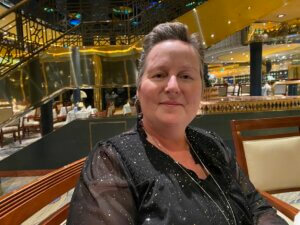
Julia after treatment
“Sometimes I wonder how am I still here? Well you know that quivering spirit from earlier? With time, it came bounding to the fore, sword in hand screaming ‘come on…let’s have you.’
Cancer Support UK’s Cancer Coach programme is available to anyone previously diagnosed with a stage 3 or below cancer and who has now completed their physical cancer treatment. The course takes participants through a series of weekly facilitated group sessions, run for a six-week period over the telephone or online video. Participants benefit from the peer support of the sessions, as well as learning tools and techniques for improving emotional wellbeing, which can help them on their recovery journey. The course is free, completely confidential and accessible from the comfort and privacy of home.
If you’ve completed cancer treatment, but are experiencing low mood, anxiety, worry, and don’t know how to move forward in your recovery, then please apply to join the course. Simply complete the application form online. If you have any questions, email cancercoach@cancersupportuk.org or call: 020 3983 7616.
